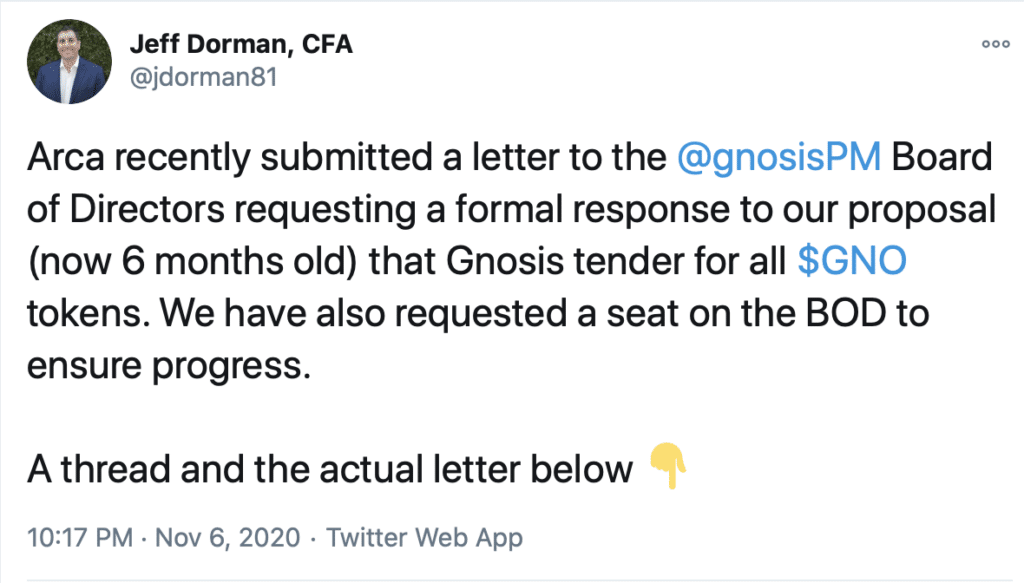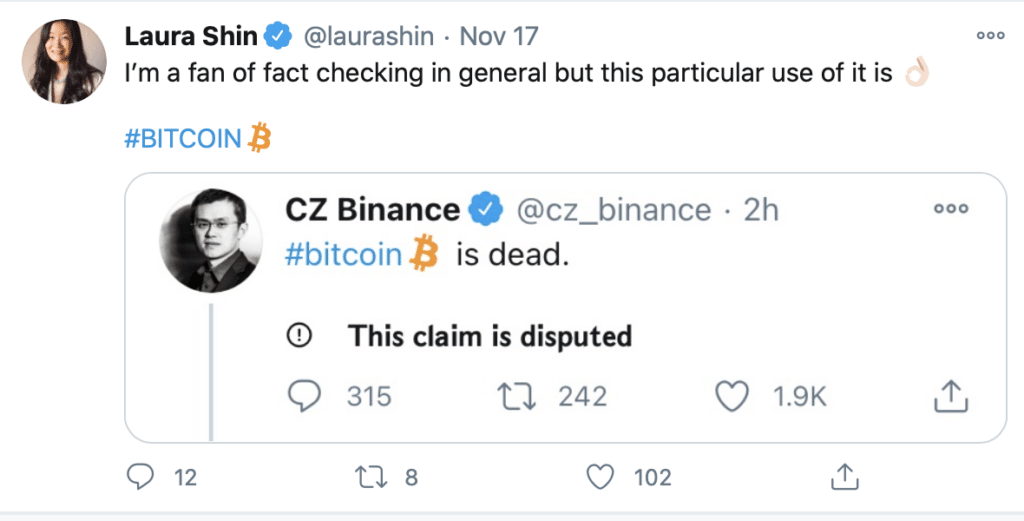Plus, 9 reasons Bitcoin is near its ATH
Binance is taking on the media with a defamation lawsuit against Forbes filed in the U.S. District Court in New Jersey over Forbes’ October story reporting on the leaked “Tai Chi” document. Bitcoin has seen one of its most bullish weeks in years, with the price continuing to hover close to all-time highs. And another billionaire has revealed that he is invested significantly in Bitcoin.
There’s a lot of regulatory news this week, some of it bullish, some of it a bit more cloudy. The ETH 2.0 team hosted its latest AMA, there’s been another wave of DeFi attacks, and one of the early ICOs is facing strong pushback from one of its first investors.
On Unchained, Jake Chervinsky and Kristin Smith discuss the looming battle around privacy in the crypto world — one that threatens the whole premise of transactions peer-to-peer from self-hosted wallets. And on Unconfirmed, Nic Carter dives into nine metrics that show the Bitcoin rally this time has come during a more mature market than we saw the last time the Bitcoin price was this high.
This Week’s Crypto News…
Binance Is Suing Forbes for Defamation
Binance Holdings Limited has filed suit against Forbes and two reporters for defamation. The lawsuit comes after Forbes published an article last month detailing alleged regulatory evasion by the crypto exchange. Binance is claiming harm at the hands of Forbes reporters Michael del Castillo and Jason Brett over a story they say “contains numerous false, misleading and defamatory statements.” Binance is demanding the story be taken down and is also asking for punitive damages.
Stephen Palley, partner at Anderson Kill, tweeted a screenshot of the lawsuit, in which Binance claimed, “Importantly, Binance does not violate, and fully complies with, all applicable laws, rules and regulations in its operations,” and commented, “Given the fact that truth is an absolute defense to a defamation claim the discovery on this particular claim is going to be interesting.”
Tensions have been rising for some time between Binance and the news media. Ironically, this lawsuit comes the same week that a group of crypto journalists (disclosure: including me) formed The Association of Cryptocurrency Journalists and Researchers, which aims to “provide education, mentorship, and training to ensure practitioners aspire to the highest ethical and journalistic standards.”
Bullish Bitcoin Signals Roundup
- Grayscale Investments’ net assets under management have surpassed $10 billion.
- Bulk orders for the latest and most powerful ASIC miners are sold out until spring, and there’s greater demand from institutions outside China.
- Skyrocketing Bitcoin prices have led to new highs in Bitcoin derivatives markets, with CME open interest in its Bitcoin futures crossing $1 billion, an all-time high.
- Mexican billionaire Ricardo Salinas Pliego, the founder of Grupo Salinas, revealed in a tweet on Wednesday that 10% of his assets are in Bitcoin. He said, “Bitcoin protects the citizen from government expropriation.”
Regulatory roundup
- SEC chairman Jay Clayton is stepping down from his post at the end of this year, months ahead of his planned June 2021 departure. This news was mostly welcomed by those in the crypto space, with Larry Cermak of The Block tweeting that this boded well for a long-awaited Bitcoin ETF. Surprisingly, on CNBC, Clayton also said the inefficiencies of existing payment systems have driven the rise of Bitcoin.
- Acting Comptroller of the Currency Brian Brooks has been nominated to a full 5-year term leading the national bank regulator. While the nomination itself is positive for crypto, CoinDesk’s Nikhilesh De tweeted why “Brooks’ path forward is murky,” citing an upcoming shakeup in the Senate Banking Committee.
- Sian Jones, who has been a major player in crypto anti-money laundering regulations, speaking at the second annual V20 Virtual Asset Service Providers Summit, said the Financial Action Task Force needs to take a wholly new approach to how it polices crypto. She said that the FATF is trying to graft existing AML regulations onto crypto intermediaries when the core of crypto is to transact without intermediaries. She suggested the regulators look more closely at DeFi. If you missed Sian on Unchained in August discussing why the travel rule is one of the most significant crypto regulations, check out the episode here.
The Latest AMA on Ethereum 2.0
The Ethereum Foundation’s Ethereum 2.0 research team hosted its fifth Reddit AMA on Wednesday, answering a bevy of technical questions, and of course, questions about the imminent launch of the new protocol. Hot topics included options for backup plans to launch in 2020 if the 16,384 validators needed for launch aren’t reached by November 24th. Vitalik said, “from a technical perspective (which is the only thing the devs can control) eth2 did launch in 2020; what happens from here is entirely up to the community.”
After the AMA, Vitalik tweeted one of his replies to the question, “What is the max supply of ETH?” Vitalik responded, “Realistically, for the next ~3 years, Ethereum will be an ecosystem under rapid transformation.” He then named a number of the technical shifts, such as transition from POW to POS, and said people should not be in Ethereum today because they believe in protecting and stabilizing the current rules, but because they believe in the roadmap and that, after the upgrade, “we actually will get to a place where the network is efficient and stable and powerful and capable of being the base of significant parts of the global economy.” Then he said over the next two years, the issuance will be 4.7M, and then after that up to 2 million a year minus fees, noting that that could be greater than issuance.
DeFi Hack Roundup
- On Tuesday, Origin Protocol lost $7 million in funds in a reentrancy attack using a flash loan that initiated a rebase, artificially inflating the supply of OUSD protocols, which were then swapped for Tether.
- An attacker drained $6 million from the Value DeFi Protocol — again using a series of complex tricks including a flash loan.
Arca Says Gnosis Should Pay Back Investors
Cryptocurrency investment company Arca, one of the first investors in decentralized prediction market Gnosis, which held an ICO in 2017, has called for investors’ money to be returned and for the project to be overhauled. Arca CIO Jeff Dorman tweeted:

Arca points to changes in Gnosis’ product roadmap and mismanagement of its treasury, arguing that as a result, the project’s products have failed to gain traction. Additionally, the letter claims that the Gnosis team has deviated from the white paper and irresponsibly managed project finances. Arca has outlined a number of recommendations for Gnosis, including buying back tokens from holders which, “would allow Gnosis to run as a lean startup, rework the token’s use cases and redistribute the remaining tokens in order to create network effects on existing products.” Gnosis cofounder Martin Koppelman said in a statement to The Block, “we had already been working on an alternative path for the GNO token, which we think is much more appealing. Our own proposal includes a Gnosis DAO and gives much more ownership to GNO holders. It will be presented to the community very soon.”
Crypto Twitter had fun with the “this claim is disputed” flag on Twitter this week, applying it to all sorts of tweets, such as this one by CZ:




